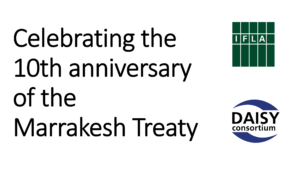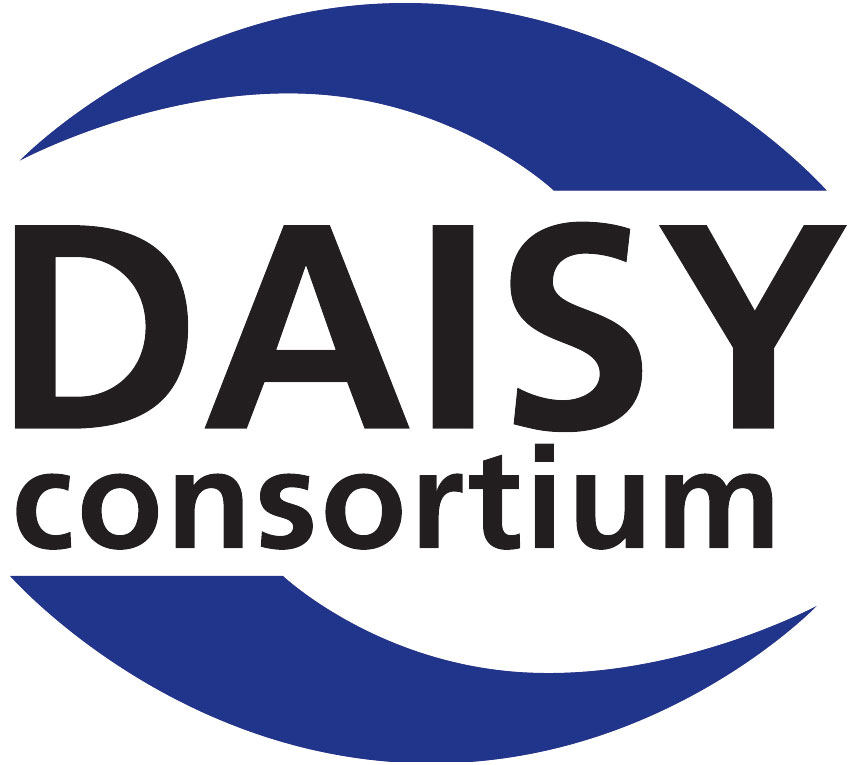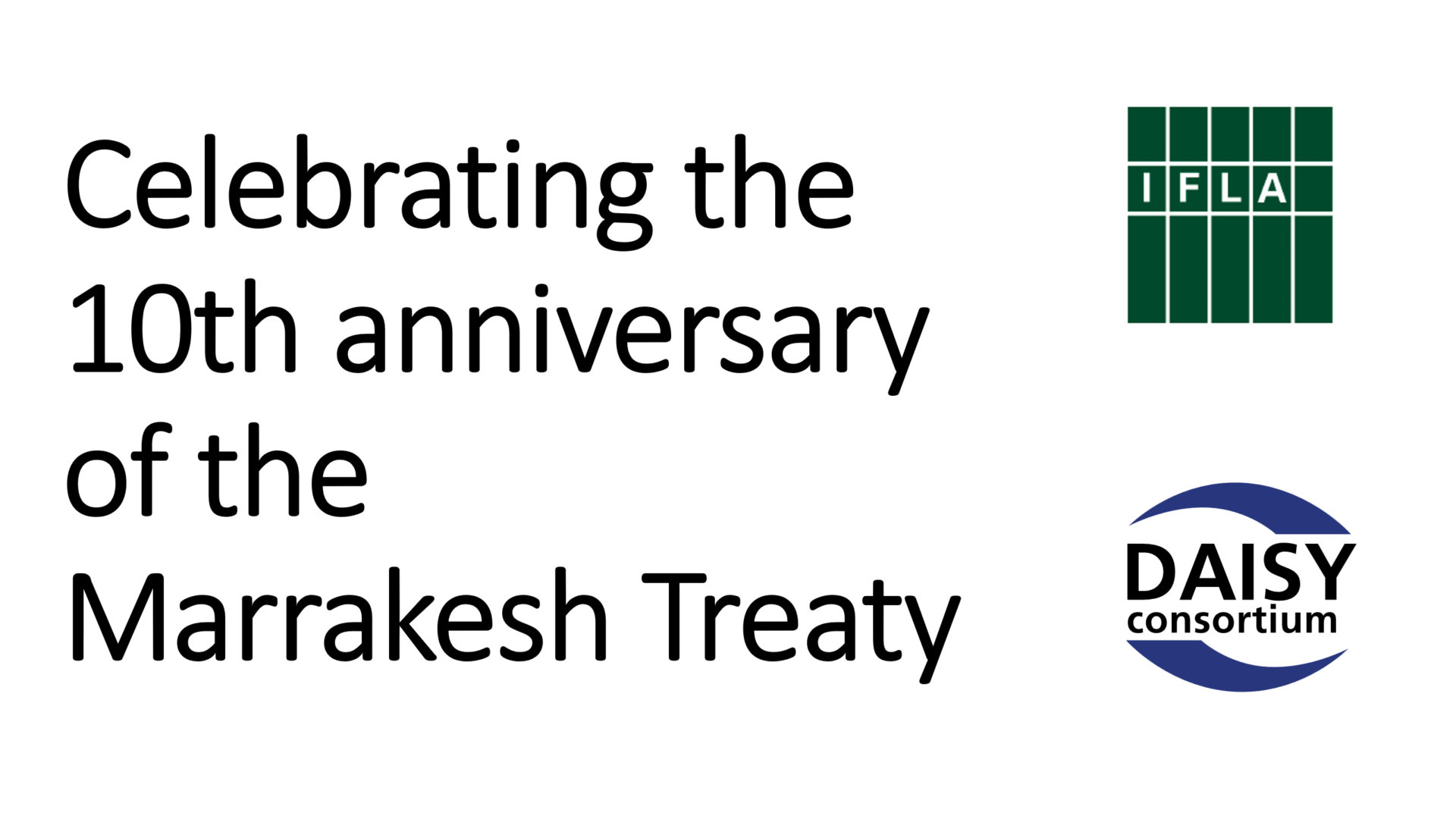Celebrating 10th Anniversary of the Marrakesh Treaty (W)
 In this special webinar hosted by the IFLA section Libraries Serving Persons with Print Disabilities in collaboration with the DAISY Consortium, we celebrate the 10th Anniversary of the Marrakesh Treaty, and explore the impact and relevance of the treaty after the first 10 years.
In this special webinar hosted by the IFLA section Libraries Serving Persons with Print Disabilities in collaboration with the DAISY Consortium, we celebrate the 10th Anniversary of the Marrakesh Treaty, and explore the impact and relevance of the treaty after the first 10 years.
This page contains:
Full Video of the Webinar
Speakers
- Dipendra Manocha, The DAISY Consortium- host and chair
- Monica Halil , WIPO Accessible Books Consortium
- Marc Workman, World Blind Union
- Richard Orme, DAISY Consortium
- Stephen Wyber, International Federation of Library Associations and Institutions (IFLA)
- Victoria Owen, IFLA
- Siobhan Dennis, Vision Australia
- Francisco Javier Martínez Calvo, ONCE
- Bárbara Martín, European Blind Union
- Yasmine Youssuf, Chair of IFLA Libraries Serving Persons with Print Disabilities Section
- Geert Ruebens IFLA LDP retired
- Teresa Hackett, Electronic Information for Libraries
Session Overview
Host: Dipendra Manocha – DAISY Consortium
Dipendra Manocha from DAISY welcomed everyone to the webinar and opened the session with some background, offering a personal perspective and his experience of the Treaty, how India prepared local legislation, and how the Treaty continues to make a significant impact for people with print disabilities.
Monica Halil, Head of the Accessible Books Consortium, WIPO
Provided some background on the Marrakesh Treaty, highlighting that there are currently 93 contracting parties covering 119 countries. The Accessible Books Consortium exists to help implement the Marrakesh Treaty at a practical level. In June 2023 there are currently 127 authorized entities globally, with 70 from developing or least developed countries. A total of 840,000 title are available for exchange under the framework of the Marrakesh Treaty, covering 80 languages.
The ABC Global Book Service is available for authorized entities in countries which have both ratified and implemented the Marrakesh Treaty, noting that while many countries have ratified, but not all have implemented the treaty into law. Monica provided a range of statistics showing the growth of the Global Library Service both in terms of use and the availability of downloadable content.
Marc Workman – CEO, World Blind Union
Marc introduced the involvement of the World Blind Union which has been at the forefront of the journey, supporting the development of the treaty, and continuing to promote enactment of the treaty worldwide. Marc highlights that progress has been made, but many governments have yet to ratify the treaty restricting full enactment of the treaty worldwide. WBU are committed to continuing the journey, providing guidance for governments, organizations and individuals.
Richard Orme, CEO DAISY Consortium
Richard introduced the DAISY Consortium, the non-profit global authority on publishing and reading for people with print disabilities, whose team of international experts develop standards, tools, and best practices that are embraced by leading technology companies, publishers and library services. DAISY tools have facilitated the production of millions of accessible books, journals, newspapers and other documents, providing free tools helping organizations and publishers to create locally relevant accessible publications. In 2022 DAISY delivered technical training and capacity building support in 100 countries.
Several stories of individual experiences were shared, including of Naveen, a 13 year old boy in rural India who is blind and like others in his class had never read a book because there were no accessible books in his school. Following a DAISY project Naveen and his classmates can now read independently using simple solar powered audio players that were provided filled with accessible textbooks thanks to the Marrakesh Treaty.
Stephen Wyber, IFLA (SLIDES)
ILFA also played a key role in the adoption and implementation of the Treaty globally. Stephen presented some of the data confirming that 45% of the countries to have ratified the Treaty have not yet implemented legislation into national law. Also raising awareness of the different ways the Treaty has been implemented, with under 10% of implementations requiring additional fees to be paid, and 18% requiring time consuming and costly commercial availability checks.
Victoria Owen, IFLA LPD
IFLA LPD created a Getting Started Guide for librarians to support implementation which provides an easy-to-understand explanation of the Treaty, describing the requirements, services and options that can be used within the Treaty. That guide has been adapted by regionals to support librarians with advice on country specific requirements.
Victoria also spoke about activity in the US and Canada to assess barriers to research publications at all levels of academic study, highlighting challenges in exchanges between countries that have minor differences in the way that have implemented the Marrakesh Treaty, differences in library metadata usage, and in library systems and user records.
Perspectives on implementation of the treaty from a library perspective, supporting global libraries in using the treaty.
Siobhan Dennis, Vision Australia
Vision Australia were involved in the first cross border exchange of titles under the Marrakesh Treaty in 2016, exchanging with CNIB in Canada and utilizing the ABC catalogue. As a new process some technical difficulties were experienced, however three titles were exchanged on the day the treaty came into force on September 30 2016. Breaking new ground is always challenging, and thankfully over time the process of obtaining titles through ABC has become significantly easier.
Francisco Javier Martínez Calvo, ONCE
ONCE have a very large collection of titles in their accessible library, with 39,000 DAISY Format books, 31,000 braille titles and 3,000 music titles. The ABC Global Book Service has access to the DAISY Format and music titles, with braille titles currently in the process of being uploaded. This has enabled accessible Spanish language titles to be made available to readers with print disabilities around the world through the Marrakesh Treaty. Just by having access to the ABC catalogue, ONCE’s book collection has gone from 74,000 to nearly 800,000. Francisco was clear that the concept of the Treaty is working fine, but that things take time to be adopted, the Marrakesh Treaty is here to stay and we will see the full potential of the Treaty in time.
Bárbara Martín, President of EBU
The European Blind Union was another organization involved in the Marrakesh Treaty since in the early negotiations and continues to be active supporting implementation and use. One of the new countries using the treaty is Ukraine who ratified the treaty in March, enabling access to accessible titles for blind and partially sighted people who are in a very difficult situation.
EBU is now working with the EU who are evaluating the directive implementing the Treaty, developing a consultation to assess how it can be improved.
In 2025 the European Accessibility Act will be implemented, delivering accessible ebooks and ebook readers for all, which is good step forward, but not enough as it only relates to some formats, importantly not braille or audio. The Marrakesh Treaty will continue to be relevant, especially for back list and older titles.
Yasmine Youssuf, Chair of IFLA LPD
Yasmine shared details of accessibility and the Marrakesh Treaty adoption within the Arabic speaking countries. There are 22 Arabic speaking countries with a total of 400 million people forming a very large group. Only 6 Arab countries have ratified the Treaty so far, and of those only UAE have amended their copyright laws to implement the Treaty. Other countries like Egypt are working on ratification. Additional challenges are present for the Arabic language in accessible content creation tools, and reading solutions. Demand for accessible titles have increased especially for educational titles. IFLA LPD along with partners, have assisted by coordinating a symposium in 2017 to encourage governments to ratify the Treaty. Subsequent changes in disability equality legislation, seen as an important step towards ratification. Additional projects have delivered more accessible titles and an authoring tool that supports Arabic.
Geert Ruebens IFLA LPD (retired)
Geert spoke about their personal experience of the treaty, representing IFLA LPD being present in negotiations and in Marrakesh for the signing of the Treaty. The treaty was the results of lengthy negotiations between representatives of rightsholders, governments, and beneficiaries. While this is the 10th anniversary, we should remember that it took almost 10 years of negotiations with contributions from many organizations prior to that point.
Teresa Hackett, EIFL – Electronic Information for Libraries
EIFL were also involved the treaty negotiations from the start, experiencing all the hard work many put into the discussion, and the joy when the agreement was reached in Marrakesh. The partners involved all knew that the Treaty had the potential to transform lives, and it had proven to deliver against that potential. It was clear from early on that librarians were going to play a key role in supporting the practical implementation of Treaty. EIFL have produced and contributed to number of resources for libraries to guide the use of the Marrakesh Treaty, and working with countries to adapt the guidance to support national legislation. The Marrakesh treaty was always about people not profit, and people will take this forward.
Related Resources
Organizations represented:
- Electronic Information for Libraries (EIFL)
- European Blind Union
- International Federation of Library Associations and Institutions (IFLA)
- IFLA Libraries Serving Persons with Print Disabilities Section
- ONCE
- Vision Australia
- WIPO Accessible Books Consortium
- World Blind Union

